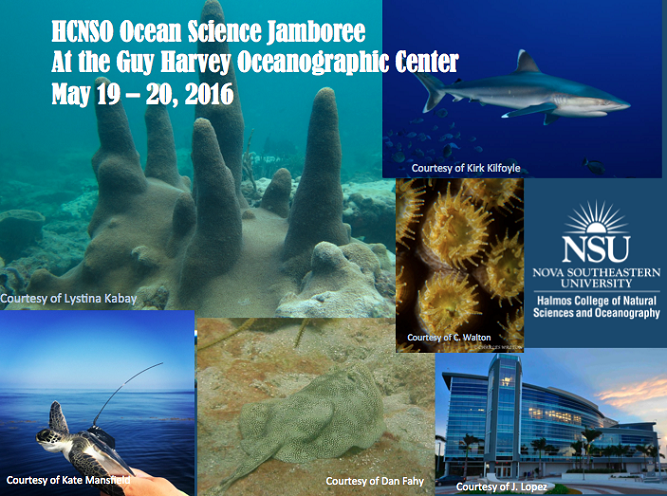Keynote Lecture: Out with the old, in with the new hypotheses: tracking behavior and habitat shifts among the sea turtle "lost years”
Location
Guy Harvey Oceanographic Center Facility
Event Website
http://biology.cos.ucf.edu/marineturtleresearchgroup/
Start
5-19-2016 4:15 PM
End
5-19-2016 5:15 PM
Abstract
From the time hatchlings depart nesting beaches and enter oceanic waters until they return to coastal areas years later as larger juveniles, virtually nothing is known about the in situ behavior and habitat use of these oceanic stage sea turtles. Classic hypotheses regarding early sea turtle distribution and behavior are based on inferred data or opportunistic sightings. Yet questions remain regarding how these young turtles interact with their physical environment, where they go, the timing of ontogenetic shifts (from oceanic to coastal habitats), and whether these young turtles are truly passive little drifters as previously assumed, or active swimmers (or both). Using novel telemetry methods, we satellite tracked lab-reared and wild-caught oceanic stage juvenile sea turtles within the western Atlantic including regions of the Gulf of Mexico (GOM) impacted by the 2010 DWH oil spill. These data represent the first satellite tracks for wild-caught oceanic stage sea turtles and result in a need to re-evaluate our understanding of the behavior and distribution oceanic stage, or “lost years” sea turtles. We also provide experimental confirmation that oceanic stage turtles are not 100% passive drifters. Turtles found in the northeastern Gulf of Mexico may be at a critical developmental juncture, shifting from one ontogenetic stage to another. Our data and methods provide a foundation for species-specific predictions of habitat use and movement models, and represent a critical starting point for a more realistic understanding of an otherwise poorly understood sea turtle life-stage.
Presenter(s) Biography
Dr. Kate Mansfield is an Assistant Professor and head of the Marine Turtle Research Group (MTRG) in the Biology Department at the University of Central Florida. Dr. Mansfield received a B.A. in both Biology and Philosophy from Mount Holyoke College (1992), a M.A. in Marine Affairs and Policy from the University of Miami, Rosenstiel School of Marine and Atmospheric Science (1995), and her Ph.D. in Marine Science from the College of William and Mary, Virginia Institute of Marine Science (2006). She has worked with sea turtles since 1994 including more than a decade of nesting beach experience and over 17 years of in-water sea turtle handling and tagging experience using satellite, radio and acoustic telemetry to track all life stages of sea turtle.
Dr. Mansfield was a member of the most recent Loggerhead Turtle Expert Working Group, was Virginia’s state sea turtle stranding coordinator for seven years, and has served on several state, federal, and international sea turtle taskforces and working groups including the IUCN Marine Turtle Specialist Group. She held postdoctoral positions at the University of Miami, Rosenstiel School of Marine and Atmospheric Science, Florida International University, and NOAA Fisheries, Southeast Fisheries Science Center as a National Academies NRC postdoctoral fellow. Her research focuses on sea turtle biology, ecology, behavior, and conservation across all life stages of sea turtle. Dr. Mansfield's recent projects include testing and deploying small-scale, solar-powered satellite tags on young, oceanic stage (“lost years”) sea turtles with the goal of describing early sea turtle dispersal and habitat use.
Dr. Mansfield’s lab and field sites include the UCF Marine Turtle Research Group’s long-term nesting beach and coastal juvenile sea turtle research programs within Archie Carr National Wildlife Refuge and the Indian River Lagoon located in central Florida. Combining these programs with Dr. Mansfield’s oceanic juvenile (“lost years”) tracking work in the Gulf of Mexico, and North and South Atlantic, the MTRG now provides a whole life history approach to understanding the biology, ecology, and conservation needs of Atlantic sea turtles—from eggs to “adulthood”.
Lab website: http://biology.cos.ucf.edu/marineturtleresearchgroup/
Instagram and Twitter: @UCFTurtleLab
Facebook: http://www.facebook.com/ucfmtrg
Keynote Lecture: Out with the old, in with the new hypotheses: tracking behavior and habitat shifts among the sea turtle "lost years”
Guy Harvey Oceanographic Center Facility
From the time hatchlings depart nesting beaches and enter oceanic waters until they return to coastal areas years later as larger juveniles, virtually nothing is known about the in situ behavior and habitat use of these oceanic stage sea turtles. Classic hypotheses regarding early sea turtle distribution and behavior are based on inferred data or opportunistic sightings. Yet questions remain regarding how these young turtles interact with their physical environment, where they go, the timing of ontogenetic shifts (from oceanic to coastal habitats), and whether these young turtles are truly passive little drifters as previously assumed, or active swimmers (or both). Using novel telemetry methods, we satellite tracked lab-reared and wild-caught oceanic stage juvenile sea turtles within the western Atlantic including regions of the Gulf of Mexico (GOM) impacted by the 2010 DWH oil spill. These data represent the first satellite tracks for wild-caught oceanic stage sea turtles and result in a need to re-evaluate our understanding of the behavior and distribution oceanic stage, or “lost years” sea turtles. We also provide experimental confirmation that oceanic stage turtles are not 100% passive drifters. Turtles found in the northeastern Gulf of Mexico may be at a critical developmental juncture, shifting from one ontogenetic stage to another. Our data and methods provide a foundation for species-specific predictions of habitat use and movement models, and represent a critical starting point for a more realistic understanding of an otherwise poorly understood sea turtle life-stage.
https://nsuworks.nova.edu/cnso_osj/may-2016/day1/25


